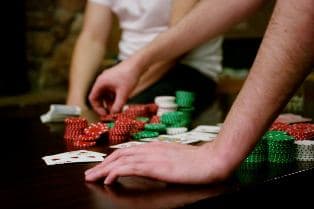How to Act When Playing Live Casino Poker (For the First Time or for the Millionth Time)

By Steve Beauregard
Poker is far unlike any other casino game, in that you’re sort of like the casino itself: you need paying customers in order to be successful.
Think about it. A casino can be dead empty, yet you’ll still be have your choice of the slots. You’ll probably be able to play blackjack, Pai Gow, craps and roulette. Yet you will not be able to play poker.
Poker players depend on other members of the general public walking into the casino to sit down and play poker. It’s a basic requirement – one we take for granted – yet one that needs to be pounded into the head of every player nearly every day.
Why? Because too often, poker players forget who their customers are. (Pssst: it’s the other 8 players sitting at your table).
I mention this, because far too many times, there are examples of “bad business” at the poker table. That is, a player berating another player for what he thinks is inferior, or suboptimal play.
It’s bad for business, for two reasons: (1) it can scare the player away or
(2) it can make him a better player.
1) Scaring the Player Away
The scene: the upstairs poker room at the then smoky Lady Luck Casino in Black Hawk, Colorado.
I’m playing $2-$10 spread limit hold’em (in which your bet can be anywhere from $2 to $10 per bet). The table is fairly fun and easy-going.
During one hand, I had flopped an open-ended straight draw. My chances of making a straight on the river were roughly 1 in 3, and with 3 other players in the pot, it was worth it to chase it down to the river.
The balding, 30ish former hockey player (he kept reminding us he played college hockey), didn’t like it when I made my straight and cracked his pocket kings. He muttered an insult under his breath, but I could barely hear it as I was raking in my pot and his chips in my pile were making too much noise.
Cut to, the very next hand, when I flopped another 1/3rd chance of making a great hand – this time the nut flush. I got there on the turn against a couple of other players including….you guessed it, balding former hockey player, who had flopped a straight.
This time, however, the loss caused him to explode. H called me a donkey, and an idiot, and other bad names I can’t mention on a respectable website. Or even this one for that matter.
After a couple more minutes of insults, I grabbed a rack and stacked up my chips to go home. My back-to-back wins of huge pots had decimated the table, as I had by far most of the chips on the table. Balding hockey player wasn’t even reloading, so the game didn’t look too profitable.
More importantly, as a guy who avoids conflict, the game wasn’t going to be fun for me. Had everyone been laughing and good sports, I would have stayed. But, when balding hockey player asked me, “Where the hell are you going?” I told him the truth: I was going to go to Ameristar (a poker room down the street), to get drunk and probably lose all of my chips.
(Go here to learn proper bad beat poker etiquette)
The chips I had won at the Lady Luck could of (and likely would have), gone back to the balding hockey player and his seat mates if only he could have been a good sport. Was opening his mouth to criticize me worth $400? I only hope his outburst made him feel better, but the look on his face said otherwise.
2) Make the bad player better.
Help the golfing partner in your foursome improve his stroke. Help your co-worker with that important report. But don’t ever help a player whose money you’re trying to win, become better at poker.
“How in the hell could you chase that flush?” shouted the angry New Yorker to the young player two seats to the left of me. I was sort of wondering the same thing, as the young player had nothing on the flop, other than a back door flush draw (meaning, when you need to hit runner, runner suited cards to make your flush). It’s a bad, unprofitable long-term play. In other words, I loved seeing it.
This took place at a $2/4 limit hold’em game at the old Oasis Poker Room in Mesquite, Nevada, but the way the New Yorker acted, you would have thought it was the final hand of the World Series of Poker Main Event.
“I had a draw,” said the young gun, to which the angry Yankee informed him that the chance of him catching his necessary two suited cards on the turn and river were astronomically low.
The young gun didn’t reply, but I could tell the wheels were turning in his head. If chasing a back door flush draw heads up in limit hold’em wasn’t a good play, well then, by golly, he wasn’t going to do it again, I pictured him thinking.
An maybe I’m wrong, but at that exact moment, a bad poker player just got a little better, all thanks to the unsolicited poker advice shared by a New Yorker angry over losing a pot.
(Phil Hellmuth shows how not to act at the poker table)
Don’t Tap the Aquarium
Ironically, pointing out inferior play, (or worse, good play that you THINK is inferior), communicates just how bad of a poker player you are.
That’s because a good poker player stays relatively emotionally level. He or she won’t berate bad play. They WANT to see bad play. Sure, it may mean you lose a pot here or there, but it’s great for the long term.
This is especially true when playing against brand new players, or bad players, otherwise known as “Fish.”
Making fun of a bad players poor play is known as “tapping the aquarium.”
Just like knocking on the glass walls of a real aquarium, “tapping the aquarium” at the poker table means you’ll scare all of the fish away. The bad player may storm out right away, or more likely, leave and never return to the card room again. After all, who wants to spend their free time giving money away to people while being ridiculed? It’s certainly bad for business.
And yet, while “tapping the aquarium” has become common verbiage in poker rooms, the phrase doesn’t really fit the constant berating of other players you’ll see and hear in card rooms across America today.
Amazingly, you’ll see a losing player mock an opponent who is his equal. In some cases, you’ll watch as an oblivious bad player criticizes a superior opponent. When a player is so bad, he doesn’t even realize he is trying to denigrate a superior player, it’s not tapping the aquarium. “Tapping the shark tank,” maybe.
It’s human psychology 101, yet it bears repeating: nothing good can come from berating an opponent at the poker table. The very short term release of anger you’ll feel is far outweighed by the internal damage you’ve created to the table vibe, the positive expected value you would have experienced, and a little to your soul.
Denigrating another player makes someone look foolish, but it’s not your opponent.
Occasionally, you’ll have a bad player berate you. He’ll wonder how you could possibly play that hand, or how you could call. Your play may or may not have been justified. Either way, instead of sharing your poker knowledge, theory or strategy on the play, just keep quiet. Or, if you’re like me, and sometimes can’t help yourself, give the obnoxious loser a wink and say,
“I’ll take all your chips, but lessons are extra.”
